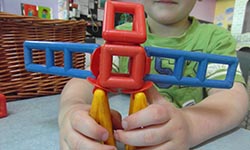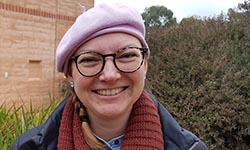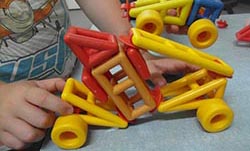- * Children have rights under the United Nations’ Convention on the Rights of the Child to participate in decisions concerning their lives, the right to privacy, and the right to play.
- * A CSU researcher has developed ethical framework that helps account for children’s rights in educational research
- * Researchers should look to what children show them during their research, not just what they say.
 A Charles Sturt University (CSU) researcher has developed a framework that allows researchers to study with children about play while recognising their rights to refuse to participate under international convention.
A Charles Sturt University (CSU) researcher has developed a framework that allows researchers to study with children about play while recognising their rights to refuse to participate under international convention.
Ms Carmen Huser, a doctoral student in childhood studies at the CSU School of Education, said that adults might not consider children’s agendas of play as they might have their own educational agendas in mind.
“However, I believe children are competent and are people worthy of study in their own right.
“My investigation explored what understandings children bring to their play, and considered how children choose to participate in research, particularly how they decided to withdraw from participation.”
Listen to Ms Carmen Huser
Loading...
 “I wanted to develop a way for children to participate in educational research that recognises the need for both their understandings and consent, while also helping adult researchers understand how they can prepare a better platform for research with children, not on them,” Ms Huser said.
“I wanted to develop a way for children to participate in educational research that recognises the need for both their understandings and consent, while also helping adult researchers understand how they can prepare a better platform for research with children, not on them,” Ms Huser said.
During the study, Ms Huser observed how young children learn cooperatively in groups, sometimes in ways contrary to how adults expect children to learn.
“Children are truly social. I saw one boy have so much trouble constructing an object from Lego using detailed instructions, while I saw a group of boys build complex Transformer toys from scratch, without any instructions!,” Ms Huser said.
“They then proceeded to show each other how they did it, how to ‘transform’ their own constructions, and how to play with them in elaborate games, all without instructions.
“If we can build this sort of interaction into our research, I am sure we can develop better, more nuanced understandings of how children learn through play.”
Ms Huser recorded videos of children at play, with their permissions, and then used these recordings to stimulate discussion on their play.
 “Some children did not want to discuss their play, while others could not describe in words what they learned when they played. Interestingly, however, they could show me what they learned, using actions to describe their play.
“Some children did not want to discuss their play, while others could not describe in words what they learned when they played. Interestingly, however, they could show me what they learned, using actions to describe their play.
“This opened up some important foundations for the framework. Children understand they have a right to privacy and participation, and we as adults, and under the Convention, need to respect that. So I looked at the spaces in which research could be carried out ethically.
“Firstly, does the physical space of the research allow the child not to participate? Can they to move away freely from the research area?
“Next, we need to consider not only what children say but what they show us say through drawings or photographs or body movements, as this can have far greater meaning for them.
“Finally, the researcher needs to develop a safe socio-emotional space, where trust is first developed between the researcher and the children and between the children.
“If we do this, the research possibilities are endless,” Ms Huser said.
Ms Huser is due to receive her Doctor of Philosophy from Charles Sturt University in December this year.





Social
Explore the world of social